List of state representatives of the People's Republic of China
Appearance
(Redirected from List of President of the People's Republic of China)
 |
|---|
|
|
The president of the People's Republic of China was created in 1954 when the first constitution consolidated the system of government in the People's Republic of China. At the time, the title was translated into English as State Chairman. The position was abolished between 1975 and 1982 with the functions of state representative being performed by the chairman of the Standing Committee of the National People's Congress. The presidency was revived under the fourth constitution in 1982.
List of state representatives
[edit]- Mao Zedong Administration
- Deng Xiaoping Administration
- Jiang Zemin Administration
- Hu–Wen Administration
- Xi–Li Administration/Xi Jinping Administration
Central People's Government (1949–1954)
[edit]- Chairman of the Central People's Government
| Portrait | Name (Lifespan) |
Term of office | Vice Chairmen | Paramount leader | |||
|---|---|---|---|---|---|---|---|
| – | 
|
Mao Zedong 毛泽东 (1893–1976) |
1 October 1949 | 27 September 1954 | Zhu De Liu Shaoqi Soong Ching-ling Li Jishen Zhang Lan Gao Gang |
Himself | |
| Mao also held more powerful offices as Chairman of the Chinese Communist Party and Chairman of the Central Military Commission, making him the Paramount leader of China. | |||||||
The 1st Constitution (1954–1975)
[edit]- Chairman of the People's Republic of China
| S. No. | Portrait | Name (Lifespan) Constituency |
Term of office | NPC | Vice Chairmen | Paramount leader | |
|---|---|---|---|---|---|---|---|
| 1 | 
|
Mao Zedong 毛泽东 (1893–1976) Beijing At-large |
27 September 1954 | 27 April 1959 | I | Zhu De | Mao Zedong |
| 2 | 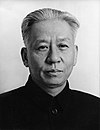
|
Liu Shaoqi 刘少奇 (1898–1969) Beijing At-large |
27 April 1959 | 3 January 1965 | II | Soong Ching-ling Dong Biwu | |
| 3 January 1965[1] | 31 October 1968[2] | III | |||||
| acting | 
|
Soong Ching-ling 宋庆龄 (1893–1981) Shanghai At-large |
31 October 1968 | 24 February 1972 | III | Dong Biwu | |
| acting | 
|
Dong Biwu 董必武 (1886–1975) Hubei At-large |
24 February 1972 | 17 January 1975 | III | Soong Ching-ling | |
- Chairman of the Standing Committee of the National People's Congress
| Portrait | Name (Lifespan) Constituency |
Term of office | NPC | Vice Chairmen | Paramount leader | |||
|---|---|---|---|---|---|---|---|---|
| – | 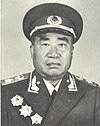
|
Zhu De 朱德 (1886–1976) Sichuan At-large |
17 January 1975 | 6 July 1976 | IV | Soong Ching-ling[3] Dong Biwu[3] (died 2 April 1975) and others |
Mao Zedong | |
| – | 
|
Soong Ching-ling 宋庆龄 (1893–1981) Shanghai At-large |
6 July 1976 | 5 March 1978 | Mao Zedong Hua Guofeng | |||
| After Zhu De's death, Soong Ching-ling served as acting Chairwoman of the Standing Committee of the National People's Congress for the remainder of the 4th National People's Congress's term.[citation needed] She was a member of the Revolutionary Committee of the Kuomintang. | ||||||||
| – | 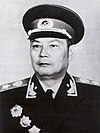
|
Ye Jianying 叶剑英 (1897–1986) PLA |
5 March 1978 | 18 June 1983 | V | Soong Ching-ling and others |
Hua Guofeng Deng Xiaoping | |
- Honorary Chairwoman of the People's Republic of China
| Portrait | Name (Birth–Death) Constituency |
Term of office | NPC | Notes | ||
|---|---|---|---|---|---|---|
| – | 
|
Soong Ching-ling 宋庆龄 (1893–1981) Shanghai At-large |
16 May 1981 | 29 May 1981 | V | Shortly before her death, Soong Ching-ling, a member of the Revolutionary Committee of the Kuomintang, was named Honorary Chairwoman of the People's Republic of China. |
The 4th Constitution (1983–present)
[edit]- President of the People's Republic of China
| Portrait | Name (Lifespan) Constituency |
Term of office | NPC — (Election) | Vice President | Paramount leader | ||
|---|---|---|---|---|---|---|---|
| 3 | 
|
Li Xiannian 李先念 (1909–1992) Hubei At-large |
18 June 1983 | 8 April 1988 | VI — (62.5%) | Ulanhu | Deng Xiaoping |
| During Li's term, China undertook major reforms in foreign policy, beginning to open up to the outside world. Li, who took on an important role in the ousting of the Gang of Four, became the first President of the People's Republic to visit the United States. He was also the first state president to visit North Korea. In 1984, Li met with U.S. President Ronald Reagan during Reagan's visit to China, notably discussing the status of Taiwan with the President. After leaving office as President, Li was then named Chairman of the National Committee of the CPPCC.[4] | |||||||
| 4 | 
|
Yang Shangkun 杨尚昆 (1907–1998) PLA |
8 April 1988 | 27 March 1993 | VII — (66.8%) | Wang Zhen | Deng Xiaoping Jiang Zemin |
| An elder from the party's revolutionary days, Yang was a political survivor of the Cultural Revolution. During his presidency, Yang promoted economic reform but opposed political liberalization. Yang reached the height of his political career after the 1989 Tiananmen Square protests and massacre, but his organized opposition to Jiang Zemin's leadership led Deng to force Yang to retire. Yang served as Vice Chairman of the Central Military Commission between 1983 and 1993. | |||||||
| 5 | 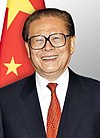
|
Jiang Zemin 江泽民 (1926–2022) Shanghai At-large |
27 March 1993 | 15 March 1998 | VIII — (68.4%) | Rong Yiren | Himself |
| 15 March 1998 | 15 March 2003 | IX — (71.5%) | Hu Jintao | ||||
| Once the mayor and party secretary of Shanghai, Jiang's assumption of the presidency in 1993 marked a return to the centralization of major titles at the national level – Jiang also held the more powerful offices of General Secretary of the Chinese Communist Party and Chairman of the Central Military Commission since 1989. Under Jiang's leadership, China experienced substantial developmental growth with continued reforms, oversaw the handover of Hong Kong from the United Kingdom and Macau from Portugal, and improved its relations with the outside world while the Communist Party maintained its tight control over the government. Jiang was criticized for being too concerned about his personal image at home, and too conciliatory towards Russia and the United States abroad.[5] | |||||||
| 6 | 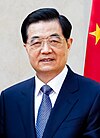
|
Hu Jintao 胡锦涛 (born 1942) Tibet At-large (until 2008) Jiangsu At-large (from 2008) |
15 March 2003 | 15 March 2008 | X — (72.9%) | Zeng Qinghong | Himself |
| 15 March 2008 | 14 March 2013 | XI — (70.27%) | Xi Jinping | ||||
| Hu, long having been anointed by Deng as Jiang's successor, took over the presidency in 2003, and also held the offices of General Secretary of the Communist Party and Chairman of the Central Military Commission. Hu presided over nearly a decade of consistent economic growth and a relatively smooth recovery from the Global Financial Crisis. China emerged as a major world power during Hu's term.[citation needed] | |||||||
| 7 | 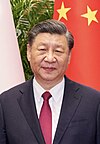
|
Xi Jinping 习近平 (born 1953) Shanghai At-large (until 2018) Inner Mongolia At-large (2018–2023) Jiangsu At-large (from 2023) |
14 March 2013 | 17 March 2018 | XII — (72.21%) | Li Yuanchao | Himself |
| 17 March 2018 | 10 March 2023 | XIII — (71.10%) | Wang Qishan | ||||
| 10 March 2023 | Incumbent | XIV — (70.60%) | Han Zheng | ||||
| Xi became President in 2013, and also held the offices of General Secretary of the Communist Party and Chairman of the Central Military Commission since 2012. Xi increased the profile of the office of president in foreign affairs, for example receiving other heads of state during the 2015 China Victory Day Parade, going on high-profile visits to the United Kingdom and the United States, and making an important address at the Global Economic Forum in Davos, Switzerland. Under his leadership, Xi strengthened mass surveillance and launched Xinjiang internment camps. Xi presided over anti-corruption campaign. In foreign policy, Xi advocated for "Wolf warrior diplomacy". Term limits for the president were removed in 2018.[citation needed] | |||||||
Timeline
[edit]
See also
[edit]- List of Chinese leaders
- Leader of the Chinese Communist Party
- Order of precedence in China
- Paramount leader - a informal list of those who have been considered the highest leader of the party and the People's Republic of China
References
[edit]- ^ "National People's Congress Notice 1". People's Daily. 3 January 1965. Archived from the original on 30 January 2014. Retrieved 2013-11-24.
- ^ "Communique of the expanded 12th plenary session of the Eighth Central Committee of the Communist Party of China". People's Daily Online. 3 January 1965. Retrieved 2013-11-24.
- ^ a b Sheng (盛), Yonghua (永華) (2006). Chronological Biography of Soong Ching-ling, 1893-1981 [宋慶齡年譜 1893-1981], in Chinese. Guangzhou: Guangdong People's Publishing [廣東人民出版社]. p. 2:1799. ISBN 7218052649.
- ^ Anderson, Kurt (7 May 1984). "History Beckons Again". Time. Archived from the original on January 18, 2005. Retrieved 19 August 2011.
- ^ Kojima, Tomoyuki (November 2001). "China's Omnidirectional Diplomacy: Cooperation with all, Emphasis on Major Powers". Asia-Pacific Review. 8 (2): 81–95. doi:10.1080/09544120120098708. ISSN 1343-9006. S2CID 154907777.


